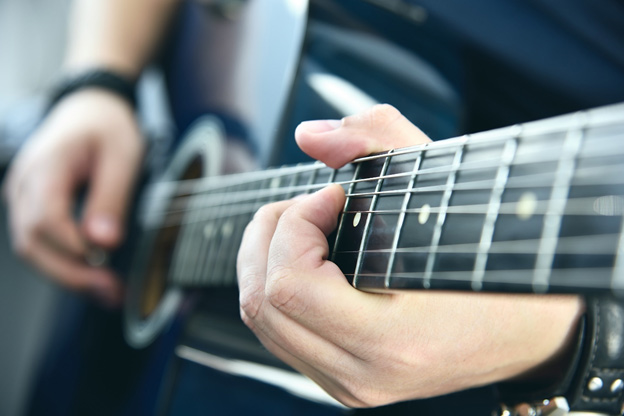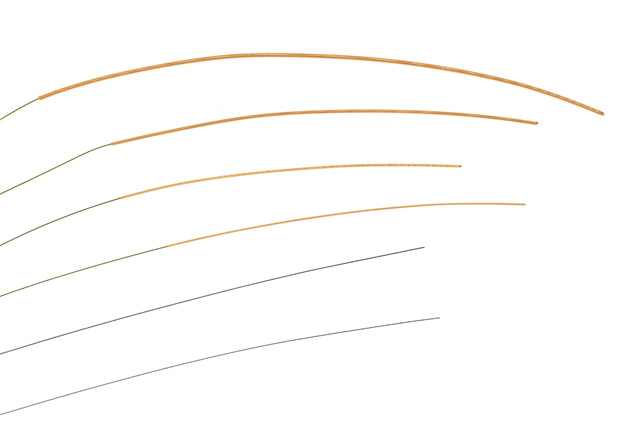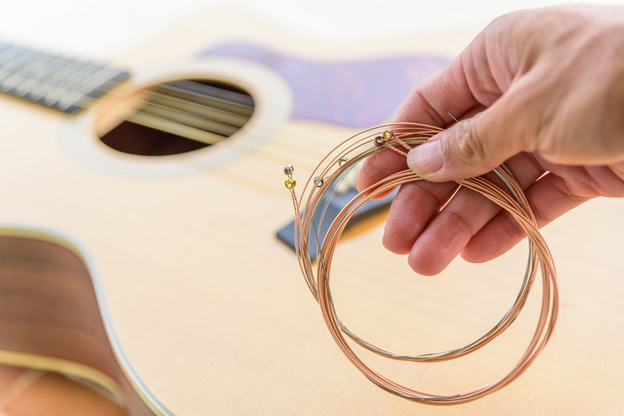How to Choose the Best Acoustic Guitar Strings
Sep 6th 2023
Tips to Know Which Guitar Strings for Acoustic Are Best

The Ultimate Guide to Choosing Guitar Strings for Your Acoustic Guitar
One of the questions we get most at Strings and Beyond is: What are the best strings for an acoustic guitar? We’d love it if there was one type of string we could recommend for everyone. But like the instrument itself, the best-sounding acoustic strings to one guitarist might be a waste of money to another guitarist. Whether you want to sound like virtuosos such as James Taylor, Joni Mitchell and Paul Simon or create a sound all your own, we’ll help you figure out which guitar strings for acoustic you should choose.
Guitar String Construction
Selecting the best acoustic guitar strings starts with how the string is built. Let’s dig into the ways construction affects a string’s sound and how long it lasts.
Acoustic String Materials
Modern acoustic strings for rock, country and blues are typically phosphor bronze or 80/20 bronze. Phosphor bronze strings are what they sound like: a mixture of phosphor and bronze. A set of 80/20 bronze strings uses an alloy of 80% copper and 20% zinc.
Phosphor bronze guitar strings have a warmer tone and are more durable. If you prefer a brighter tone, go with 80/20 acoustic strings. In both cases, the B and high-E strings are all-steel like electric guitar strings.
Some manufacturers also offer nickel-plated bronze strings. Although these are easy to play and bend, they corrode much faster. Some nickel acoustic strings need to be replaced in as little as two weeks — that’s a lot of string changes!

String Cores and Winding
The winding materials are wrapped around a steel core. The most common is a hex core, which helps grip the winding so you get a brighter, more consistent sound. Other guitarists prefer more flexible round cores that produce a warmer vintage sound.
Nearly all rock and blues guitarists use round-wound strings, which produce a brighter tone from their textured surface. Flat-wound strings have a very dark tone often preferred by jazz guitarists, and half-round strings are — you guessed it — halfway between the two.
What About Nylon Acoustic Strings?
Many classical acoustic guitars use nylon strings, which produce tones ideal for classical, jazz, flamenco and bossa nova. In most cases, guitars were designed for nylon or metal strings. Metal holds much more tension than nylon, which will eventually damage the neck, bridge and saddle on a classical guitar. Conversely, nylon strings on a steel string guitar have less stable tuning and are too close together for some guitarists’ comfort.

Acoustic Guitar String Gauges
We’ve written previously about how gauge affects sound in our Acoustic Guitar String Gauges Guide. Still, given how important the topic is, it’s worth revisiting.
What Acoustic String Gauges Are There?
Acoustic guitar strings generally come in four classifications: extra-light, custom light and medium. Some manufacturers also offer heavy strings, super-light strings or combo setups. The size chart below is used by both D’Addario and Elixir, making it a good point of reference:
- Extra-Light: 0.010, 0.014, 0.023, 0.030, 0.039, 0.047
- Custom Light: 0.011, 0.015, 0.022, 0.032, 0.042, 0.052
- Light: 0.012, 0.016, 0.024, 0.032, 0.042, 0.053
- Medium: 0.013, 0.017, 0.026, 0.035, 0.045, 0.056
Which Acoustic String Gauge Should I Use?
While sound is the most important consideration, your experience level, the guitar’s design and even the tuning play a role when choosing an acoustic string gauge.
- Sound and Tone: Lighter strings stress the higher notes, giving your guitar a brighter tone. Heavier strings have a warmer, more balanced tone.
- Playability: Lighter string gauges don’t require as much finger strength, making them a great choice for beginners and casual players.
- Durability: Heavier gauges last longer, so lean towards them if you don’t want to change strings as often.
- Guitar Style: Most guitars sound best when the body and string gauge are proportional — i.e. lighter gauges for small-body guitars and heavier gauges for large-body guitars.
- Tuning: Heavier strings are better at maintaining tension for common down-tunings (E-flat standard, Drop D, etc.).
- Play Style: Heavy strings stand up better to hard strumming, whereas light strings make finger-picking easier.
Coated Acoustic Guitar Strings
Pioneered by Elixir, more manufacturers offer strings with a thin polymer coating. The obvious advantage to coated guitar strings is that they resist corrosion from your grubby body oils, sweat and moisture, meaning the strings last longer.
However, coated strings are more expensive than uncoated strings. More importantly, the coatings can dull the tone, particularly on high notes. The strings also have less grip. To this end, Elixir now has two acoustic string coatings: the original POLYWEB® coating for maximum longevity and a thinner OPTIWEB® coating if you want a brighter sound and a more natural feel.
Strings for an Acoustic-Electric Guitar
While it looks like a regular acoustic guitar, an acoustic-electric guitar (AEG) has a few internal differences that may influence your string choice. Most AEGs use a non-magnetic piezo pickup. With this design, string material and construction have less effect on the sound, meaning you can amplify other factors. If your guitar has another type of pickup — especially a magnetic one — follow the manufacturer’s recommendations.

Changing Acoustic Guitar Strings
Eventually, everyone must change their guitar strings. But did you know choosing acoustic strings is related to how often you replace them? As strings age, the tone gets duller — even on coated strings. As such, many guitarists change strings frequently to enjoy the brightest sound possible. We’ve met players who swap them before every show! If you’re changing strings often regardless, you don’t need to worry about getting strings designed to last.
We hope you’ve enjoyed this overview of acoustic guitar strings. If you have further questions, contact Strings and Beyond at 1-877-830-0722.

